Empowering Women from the Fishing Community in Odisha: A Struggle for Recognition and Livelihood
Sitting by the shoreline of Podempeta, a small fishing village nestled along the picturesque coast of Odisha, 65-year-old S Budi Amma gazes out at the vast expanse of the sea. Her weathered hands, tell the tale of a life intimately intertwined with the rhythms of the ocean. For generations, Budi Amma’s family has relied on the bounties of the sea for their livelihood, casting their nets and venturing into the depths of the water in search of fish.
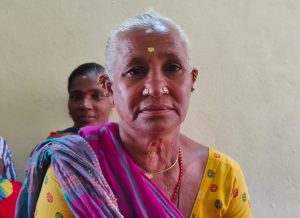
But today, the waves carry a different story. The combined challenges of climate change and fishing bans have cast a shadow over the livelihoods of the fishing community in Odisha, and the resilient women who stand at its forefront often bear the heaviest burden. Budi Amma, like many other women from her community, has silently shouldered the weight of uncertainty and hardship.
As she watches the turbulent sea, Sita reflects on the dwindling fish catch and the abrupt halt in fishing activities that the annual bans impose. Her hands, once accustomed to sorting and segregating the day’s catch, now find themselves idle for months at a time.
The first ban, implemented from April to June, aims to protect the breeding grounds of various fish species. During this period, fishing activities are restricted to ensure the sustainable reproduction and growth of fish populations. The second ban, which occurs from November to May, is specifically imposed to safeguard the breeding and mass nesting of the Olive Ridley sea turtles. These majestic creatures visit the shores of Odisha during this time for their annual nesting rituals.
The impacts of climate change have taken their toll on the delicate ecosystem of the sea. Rising sea temperatures and unpredictable weather patterns have disrupted the once-abundant fish populations that sustained the fishing community for generations. The intrusion of saltwater into freshwater estuaries has further diminished the breeding grounds and nurseries, exacerbating the decline in fish stocks.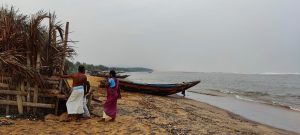
Ranjan Panda, environment and climate expert shared, “Climate change has resulted in sea-level rise and coastal erosion, affecting the coastal habitats and breeding grounds of fish species. As a consequence, the fishing community of Odisha is grappling with economic losses, and increased vulnerability.”
“Urgent measures to mitigate and adapt to climate change are needed to safeguard both the fish populations and the well-being of the fishing community in Odisha,” he added.
Women from the fishing community in Odisha have been disproportionately affected by the impacts of climate change. With the decline in fish stocks, women who are involved in fish processing, marketing, and selling face reduced income opportunities. The decreased availability of fish has led to increased competition among women for limited resources, making it even more challenging for them to earn a sustainable livelihood.
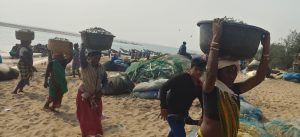
Additionally, women in the community often have limited access to resources, information, and decision-making processes related to climate change adaptation and mitigation strategies. Their voices and perspectives are often marginalized in discussions and policy-making, hindering their ability to influence decisions that directly impact their lives.
S Budi Amma said, “Earlier there used to be varieties of fish many of which have vanished. Getting Elish/ilsa fish used to be exciting in those days as we used to get a handsome amount for that, but now Elish fish is not found on the coasts of Odisha.”
Gender Disparity:
However, the gender-based disparities in compensation deepen the challenges faced by women like Budi Amma. While the government provides a one-time compensation to a male member of each fishing household during the bans, women are left excluded from this support. Earlier the compensation amount was Rs 7,500 which has now been increased to Rs 15,000. However, it is disheartening to witness the exclusion of women from this compensation scheme. This exclusion not only deepens gender disparities within the fishing community but also fails to acknowledge the significant contributions made by women in the sector.
Role of Women in the Fishing Community:
For generations, women from the fishing community in Odisha have played a vital role in the fishing industry. They actively engage in the sorting, segregating, and selling of fish, ensuring the smooth functioning of the business. However, with the decline in fish catch and subsequent reduction in fishing-related activities, the livelihoods of these women have been severely impacted. Many find themselves compelled to seek alternative employment or migrate to urban areas in search of better opportunities.
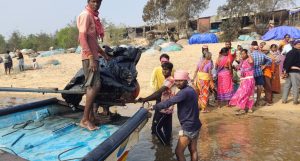
Kanda Alaya, the General Secretary of the Odisha Traditional Fish Workers Union and Vice President of the National Fish Workers Forum expresses his concern about the hardships faced by women in the fishing community. He remarks, “It is disheartening to see that women from the fishing community still struggle to earn a better living or receive financial compensation for the eight-month ban. They need support as they also bear the brunt of the ban, just like male fishermen.”
Alaya reveals that they have proposed the implementation of value-added fish processing units for women fishermen. This initiative would allow fish to be sourced from places like Visakhapatnam and Paradip during the ban period, enabling women to engage in value addition activities and continue their business. Unfortunately, no action has been taken on this proposal. However, there is a welfare scheme that provides women with the financial support of Rs 10,000, an icebox, and assistance in purchasing a vehicle to start a business.
Struggles and Challenges:
The personal narratives of individuals within the fishing community serve as a testament to the hardships faced by women. C H Potama, from Podempeta village, said, “People mostly think men from the community are the only ones involved in the fishing business. However, that’s not true. Women play an important role as well. Women from the community were mostly responsible for segregating fish according to their size, variety, and quality. This apart, they are the ones who would visit villages to sell the fish.”
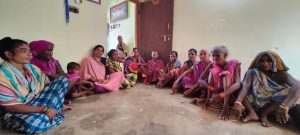
CH Potama, like many others, reminisces when her daily routine involved traveling long distances to sell fish and earn a decent income. However, due to climate change and fishing bans, she now finds herself confined to her home, struggling to find alternative means of income.
Another fisherwoman, L Rajulamma, aged 45, shares her experience of migration during the fishing ban period. She reveals, “I have been migrating to Chennai, Visakhapatnam, Rajmandri to work as a laborer at construction sites. I stay outside the state for 7 months not only due to the fishing ban but also because of a decrease in fish catch.”
These stories shed light on the challenges faced by women in the fishing community, who lose their livelihood options during the ban period and are forced to seek labor work away from home.
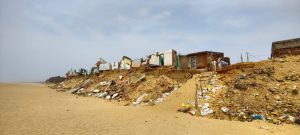
Loss of Habitat:
Podompetta village has already borne the brunt of sea erosion, with over 800 houses being submerged, and the remaining houses have been abandoned by fearful villagers. Ramayapatanam village, located in the Chikiti block of Ganjam district in Odisha, is facing a similar fate. Over 80 houses have already been swept away by sea erosion in Ramayapatnam. To protect the village from further damage, the Odisha government has commenced the construction of a sea wall, which is expected to be completed soon.
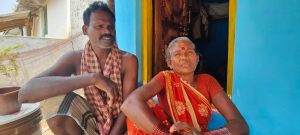
E Laxmiama and her husband, E Adinaryan, from Ramayapatanam village, have lost their home to sea erosion and are currently residing in a house provided under the Odisha Disaster Recovery Project (ODRP) in Sorolo, within the Chikiti block. However, due to the ODRP colony’s distance from the coast, many fishing families from the community choose not to live there, as they face difficulties in accessing the sea and are concerned about their boats. Nevertheless, some families like that of Laxmiama with no other option are residing in these houses, albeit struggling to sustain their livelihoods.
Previously, E Laxmiama used to assist her husband when he went out to sea for fishing. However, nowadays, she mostly stays in the ODRP colony. “Climate change is leading to a rise in sea levels, and as a result, those residing near the coast are the most severely affected, losing both their homes and livelihood options. We had constructed a new house, but it was swept away six years ago due to sea erosion,” explained Laxmiama.
Sharing about challenges related to livelihood in their new habitat, Laxmiama said “When we lived in Ramayapatnam village, we earned a good income from fishing. Even I used to work and earn money by selling fresh and dried fish. However, things have changed. Staying away far from the coasts has affected our livelihood.”
Migration and Changing Aspirations:
The adverse circumstances faced by the fishing community have led to a shift in aspirations among the younger generation. Children are no longer inclined to continue this traditional fishing business and are seeking opportunities in other sectors. Many opt to work in urban areas, where they can earn comparatively higher wages.
Consequently, the once-thriving fishing communities are witnessing a significant outflow of skilled labour, impacting their cultural and economic fabric.
The younger generation of the fishing community is displaying a growing disinterest in engaging in the traditional fishing business. Instead, they are focusing on enhancing their skills to pursue better livelihood opportunities. CH Priya, a 20-year-old girl from Sonepur, has chosen not to join her family’s fish business. Instead, she has undergone training in the beauty industry and plans to open her beauty parlour.
Reflecting on her decision, she explains, “I have witnessed my mother’s hard work. She used to travel long distances to sell fish, sometimes not returning until the next day. Despite her efforts, she struggled to earn enough or save. I had no interest in entering that business. After completing my higher secondary education, I took a beautician course, and now I am working in a parlor. The earnings are good, and I am happy with this career choice.”
Empowering Women for a Sustainable Future:
To address the challenges faced by women in the fishing community, it is crucial to provide them with support, recognition, and opportunities for empowerment. Initiating training programs to enhance their skills and knowledge, especially in areas such as fish processing and value addition, can open new avenues for income generation.
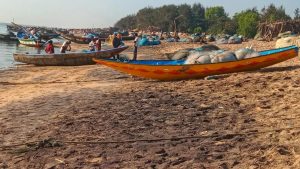
As highlighted by Selvin Rao, founder of Views India, an NGO working with fishing communities, “We train mid-age women to make dry fish, while young girls from the community are given training in tailoring and beautician courses among others. We are doing this in four villages in Ganjam district.”
By equipping women with valuable skills, they can explore alternative livelihood options and gain financial independence, he added.
Conclusion:
Recognizing their pivotal role, addressing gender disparities in compensation, and providing support for skill development and entrepreneurship are essential steps toward empowering these resilient women. Selvin Rao emphasizes the importance of empowering women from the fishing community, stating, “Women do have an important role in the fishing sector, but they lacked recognition. Earlier, women were involved in making fishing nets, which they don’t do now as they are easily available in the market.”
By acknowledging their contributions and providing them with the necessary tools and resources, we can ensure a sustainable and inclusive future for the fishing communities of Odisha, he added.
Note: Monalisa Patsani is a Laadli Media Fellow. The opinions and views expressed
are those of the author. Laadli and UNFPA do not necessarily endorse the views.

Comments are closed.